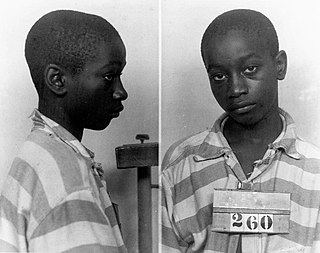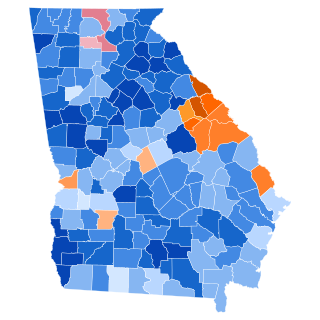Related Research Articles

James Strom Thurmond Sr. was an American politician who represented South Carolina in the United States Senate from 1954 to 2003. Before his 48 years as a senator, he served as the 103rd governor of South Carolina from 1947 to 1951. Thurmond was a member of the Democratic Party until 1964 when he joined the Republican Party for the remainder of his legislative career. He also ran for president in 1948 as the Dixiecrat candidate, receiving over a million votes and winning four states.

Edgefield County is a county located on the western border of the U.S. state of South Carolina. As of the 2020 census, its population was 25,657. Its county seat and largest community is Edgefield. The county was established on March 12, 1785.

Essie Mae Williams was an American teacher and author. She is best known as the eldest child of Strom Thurmond, Governor of South Carolina (1947–1951) and longtime United States senator, known for his pro-segregation politics. Of mixed race, she was born to Carrie Butler, a 16-year-old African-American girl who worked as a domestic servant for Thurmond's parents, and Thurmond, then 22 and unmarried. Williams grew up in the family of one of her mother's sisters, not learning of her biological parents until 1938 when her mother came for a visit and informed Essie Mae she was her mother. She graduated from college, earned a master's degree, married, raised a family, and had a 30-year professional career in education.

Lake Strom Thurmond, officially designated J. Strom Thurmond Reservoir at the federal level, and Clarks Hill Lake by the state of Georgia, is a man-made reservoir at the border between the U.S. states of Georgia and South Carolina in the Savannah River Basin.

George Bell Timmerman Jr. was an American politician and World War II veteran who served as the 105th governor of South Carolina from 1955 to 1959. A member of the Democratic Party, he previously served as the state's 76th lieutenant governor from 1947 to 1955.

The 1954 South Carolina gubernatorial election was held on November 2, 1954, to select the governor of the state of South Carolina. George Bell Timmerman won the Democratic primary and ran unopposed in the general election becoming the 105th governor of South Carolina.

George Junius Stinney Jr. was an African American boy who, at the age of 14, was convicted and then executed in a proceeding later vacated as an unfair trial for the murders of two young white girls in March 1944 – Betty June Binnicker, age 11, and Mary Emma Thames, age 8 – in his hometown of Alcolu, South Carolina. He was convicted, sentenced to death, and executed by electric chair in June 1944, thus becoming the youngest American with an exact birth date confirmed to be both sentenced to death and executed in the 20th century.

Matthew James Perry Jr. was an attorney and in 1979 appointed as the first African-American United States district judge in South Carolina, serving on the United States District Court for the District of South Carolina. In 1976 he had been the first African-American attorney from the Deep South to be appointed to the federal judiciary, which he served on the United States Court of Military Appeals. Perry established his career with civil rights litigation, defending Gloria Blackwell in Orangeburg, South Carolina, in her 1962 suit against her arrest for sitting in the whites-only area of the regional hospital while waiting for emergency treatment for her daughter. Other landmark cases included achieving the integration of Clemson University and reapportionment of the state legislature.

The 1956 South Carolina United States Senate special election was held on November 6, 1956, to select the U.S. Senator from the state of South Carolina simultaneously with the regular Senate election. The election resulted from the resignation of Senator Strom Thurmond on April 4, 1956, who was keeping a campaign pledge he had made in the 1954 election. Thurmond was unopposed in his bid to complete the remaining four years of the term.

The 1950 South Carolina United States Senate election was held on November 7, 1950, to select the U.S. Senator from the state of South Carolina. Incumbent Democratic Senator Olin D. Johnston defeated Strom Thurmond in a bitterly contested Democratic primary on July 11 and was unopposed in the general election.
Henry Michael Herlong Jr. is a senior United States district judge of the United States District Court for the District of South Carolina.
George Bell Timmerman Sr. was a United States district judge of the United States District Court for the Eastern District of South Carolina and the United States District Court for the Western District of South Carolina.

The South Dakota State Penitentiary is a state prison located in South Dakota's largest city, Sioux Falls. The building's industry shop makes several things for the state, including woodwork and license plates. The State Penitentiary also houses South Dakota's death row for men and the state's execution chamber.
The Southern Governors' Association(SGA), formerly the Southern Governors Conference, was a United States association of governors founded in 1934 and dissolved in 2016. It was the oldest and historically the largest of the regional governors associations. Since its first meeting 90 years ago to discuss the repeal of discriminatory rates for transporting goods by rail, the SGA had represented the common interests of Southern chief executives and provided a vehicle for promoting them. SGA was a nonpartisan enterprise where shareholders could exchange views and access data, information and expertise on issues of general importance in order to augment the deliberations of public, private and non-profit decision-makers in the American South. SGA operated as an instrumentality of the states.

The 1948 United States presidential election in Georgia took place on November 2, 1948, as part of the wider United States presidential election. Voters chose 12 representatives, or electors, to the Electoral College, who voted for president and vice president.
The lynching of Willie Earle took place in Greenville, South Carolina on February 16, 1947, when Willie Earle, a 24-year-old black man, was arrested, taken from his jail cell and murdered. It is considered the last racially motivated lynching to occur in South Carolina. The subsequent trial gained much media attention, and was covered by Rebecca West for The New Yorker. The trial resulted in the acquittal of 31 white men who had been charged with Earle's murder.

The 1948 United States presidential election in South Carolina took place on November 2, 1948, as part of the 1948 United States presidential election. State voters chose eight electors to the Electoral College, which selected the president and vice president.

Michael Del Priore was an American master portrait artist with an international reputation, known for oil and pastel portraits in the Classical Realism style.

On August 28, 1957, Strom Thurmond, then a Democratic United States senator from South Carolina, began a filibuster intended to prevent the passage of the Civil Rights Act of 1957. The filibuster—an extended speech designed to stall legislation—began at 8:54 p.m. and lasted until 9:12 p.m. the following day, a duration of 24 hours and 18 minutes. This made the filibuster the longest single-person filibuster in United States Senate history, a record that still stands as of 2024. The filibuster focused primarily on asserting that the bill in question, which provided for expanded federal protection of African American voting rights, was both unnecessary and unconstitutional, and Thurmond recited from documents including the election laws of each U.S. state, Supreme Court decisions, and George Washington's Farewell Address. Thurmond focused on a particular provision in the bill that dealt with certain court cases, but opposed the entirety of the bill.
References
- ↑ "State v. Logue". CaseText. 1944-01-19. Archived from the original on 2023-03-04. Retrieved 2023-03-04.
- 1 2 3 4 5 6 7 8 9 10 11 12 13 14 15 16 17 Bass, Jack; Thompson, Marilyn W. (2002). Ol' Strom: An Unauthorzied Biography of Strom Thurmond. University of South Carolina Press. pp. 63–71. ISBN 9781570035142.
- 1 2 3 O'Neil, Duay (2014-10-10). "From a dead calf to the South Carolina electric chair". Newport Plain Talk. Archived from the original on 2023-03-05. Retrieved 2023-03-05.
- ↑ "Davis Way Timmerman | Military • United States World War I Draft Registration Cards, 1917-1918" . FamilySearch. 1918-09-12. Retrieved 2023-03-04.
- 1 2 "Edgefield County Sheriff Returning with Two Wanted Men". The State . 1941-10-23. p. 13. Archived from the original on 2023-03-06. Retrieved 2023-03-06– via Newspapers.com.
- 1 2 3 "Edgefield Man Shot to Death in Own Store". The Greenville News . 1941-09-18. p. 1. Archived from the original on 2023-03-18. Retrieved 2023-03-18– via Newspapers.com.
- ↑ "Susie B. Stidham" . FamilySearch . Retrieved 2023-03-05.
- ↑ "John Wallace Logue | Military • United States World War I Draft Registration Cards, 1917-1918" . FamilySearch . 1918-06-05. Retrieved 2023-03-04.
- ↑ "Infant Logue | South Carolina Deaths, 1915-1965" . FamilySearch . 1930-12-27. Retrieved 2023-03-05.
- ↑ "Clarence Bagwell - Death • South Carolina Deaths, 1915-1965" . FamilySearch . 1943-01-15. Retrieved 2023-03-23.
- ↑ "George Reed Logue (1888-1943)" . FamilySearch . 1943-01-15. Retrieved 2023-03-23.
- ↑ "Joseph Frank Logue (1908-1990)" . FamilySearch . Retrieved 2023-03-15.
- ↑ "Joseph Frank Logue (1883-1924)" . FamilySearch . Retrieved 2023-03-15.
- 1 2 3 4 5 6 7 8 9 10 11 12 13 Poland, Tom (2013-11-01). "How a Mule Kick Killed Eight People". Midlands Biz. Archived from the original on 2023-03-05. Retrieved 2023-03-04.
- 1 2 3 4 "The Judge". WYFF4. 2003. Archived from the original on 2008-02-06. Retrieved 2023-03-18.
- ↑ "Logue in State Penitentiary; Sheriff Allen Had Death Premonition". The Greenville News . 1941-11-18. p. 1. Archived from the original on 2023-03-06. Retrieved 2023-03-06– via Newspapers.com.
- 1 2 3 4 "Woman, Two Men Pay for Killing". The Gaffney Ledger. 1943-01-16. p. 1. Archived from the original on 2023-03-19. Retrieved 2023-03-19– via Newspapers.com.
- ↑ "Edgefield Sheriff Returns with Two Prisoners". The State . 1941-10-25. p. 13. Archived from the original on 2023-03-06. Retrieved 2023-03-06– via Newspapers.com.
- ↑ "Feud Over Calf Results in 2 Deaths". The Item (Sumter, South Carolina). 1941-11-17. p. 1. Archived from the original on 2023-03-18. Retrieved 2023-03-18– via Newspapers.com.
- ↑ "Accused Men Taken to State Prison". The Herald (Rock Hill, South Carolina). 1941-11-10. p. 3. Archived from the original on 2023-03-18. Retrieved 2023-03-18– via Newspapers.com.
- ↑ "Sheriff Announces 'For Hire' Killing Confession Made". The Greenville News . 1941-11-10. p. 1. Archived from the original on 2023-03-18. Retrieved 2023-03-18– via Newspapers.com.
- 1 2 "Reported Inquests in Edgefield Killings Will Be Held Within Next Several Days". The Index-Journal (Greenwood, South Carolina). 1941-11-21. p. 8. Archived from the original on 2023-03-19. Retrieved 2023-03-18– via Newspapers.com.
- ↑ "Venue Change Motion Filed in Logue Case". The Columbia Record . 1942-01-02. pp. 1, 2. Archived from the original on 2023-03-18. Retrieved 2023-03-18– via Newspapers.com.